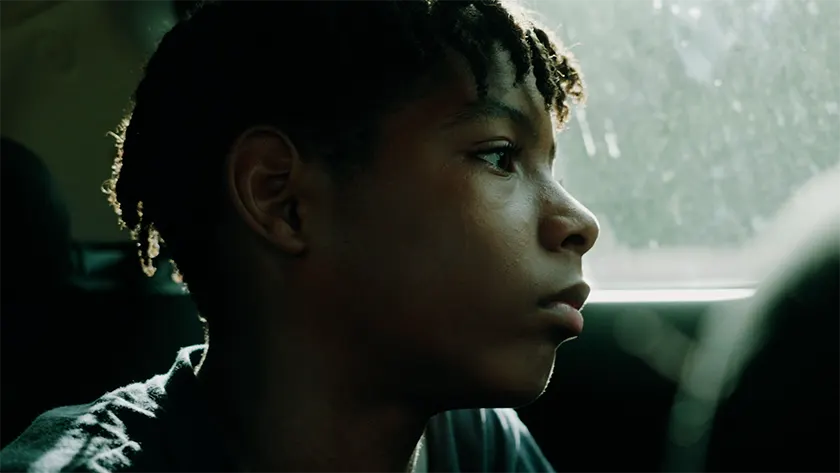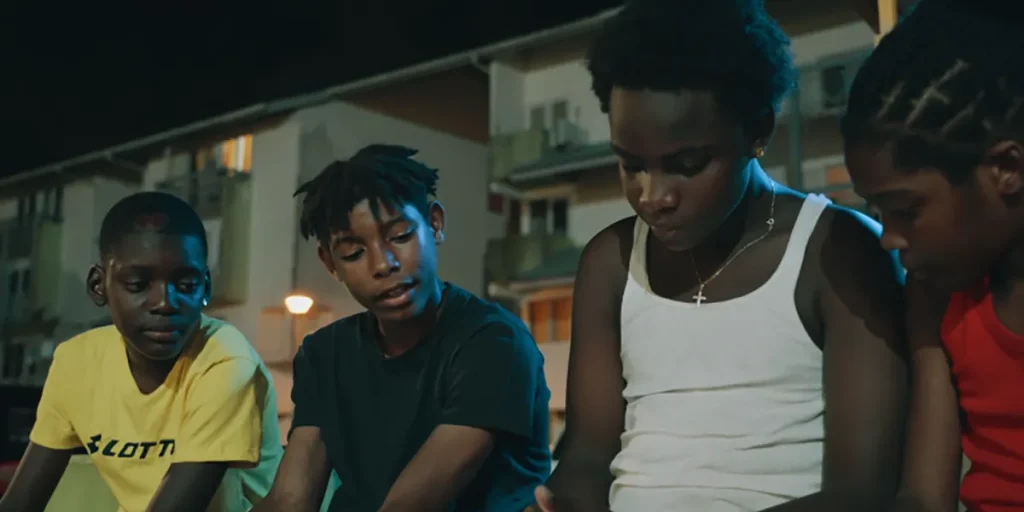Through documentary and fictional footage, Kouté vwa tells a painful personal story through the eyes of those who lived it in the context of French Guinea’s history.
Director: Maxime Jean-Baptiste
Genre: Documentary, Drama
Run Time: 77′
Open City Documentary Festival Screening: May 11, 2025
Release Date: TBA
At the Q&A that followed the screening of Kouté Vwa at the Open City Documentary Film Festival, director Maxime Jean-Baptiste talked about his connection to the story, which focuses almost entirely on the death of his cousin. He said that the only way he could imagine telling such a personal story was by keeping a distance from it.
Given the very personal nature of the film, Jean-Baptiste faced the real challenge of having to remove himself from the story in order to avoid making it about him, all while keeping the focus on its real-life subject instead.
Koute Vwa tells the story of Lucas Diomar, the director’s cousin, who was killed in 2012 in French Guiana. Starting with a voiceover interview talking over the opening titles, the documentary introduces us to the invisible protagonist of its story, Lucas Diomar, through the voices of his family members. If Lucas is this tale’s subject matter, never on the screen but always talked about and remembered in every shot, his family is the beating heart of the documentary. With their passionate conversation and powerful commentary on grief, they keep his memory alive. As the documentary goes on, Lucas’ absence only becomes more evident and more painful the more we hear about his life and his untimely tragic death.
But this documentary is not about death; it very much feels like it is about life. Kouté Vwa is a heartbreaking and touching tribute to the person Lucas was. It is also about his family’s life and how they have learned to live with this heartbreaking absence. In the face of trauma and grief, we hear Lucas’ family come to terms with his death, especially through the conversation between his mother, Nicole, and his nephew, Melrick. As Nicole invites her grandson to choose forgiveness rather than revenge, the audience, too, is invited to listen to this message of hope and peace.

The film is also about the country it is set in. Rooted in the historical context of French Guiana, which many of us in the audience may not be familiar with, Kouté Vwa is a reflection on the country’s painful historical past and its relationship to violence and trauma in the postcolonial world. Through Lucas’ personal life, Jena-Baptiste paints the picture of a country that is still coming to terms with its past and invites it, as well as the audience, to accept a message of compassion for the future.
The combination between scripted content, archival, and documentary footage is fascinating and successful at times, but it also makes the tone of the movie unclear, almost as if it was struggling to choose how exactly it wants to narrate this story. While the desire to touch on so many different topics and issues is admirable, it ultimately only makes the final product more confusing. When the film ended, I could not help but feel like I would have had to watch it again to completely understand its nuances, and all the different narratives it wants to reflect on.
Overall, Kouté Vwa is an innovative documentary and an impressive feature debut for the director, who took a very personal story to explore the universal themes of trauma, violence, and grief. With its relatively short timeline, the film could have definitely done more with these topics and explored them a little further than it actually does during its runtime, but it remains a strong movie and a very touching tribute for all those personally affected by the tragedy.
Kouté Vwa (Open City Documentary Festival): Movie Plot & Recap
Synopsis:
Kouté Vwa follows a conversation between Melrick and his grandmother Nicole as they talk about the tragic murder of Lucas Diomar, Nicole’s son and Melrick’s uncle. Through their dialogue, the audience learns more about Lucas’ life and how his absence has impacted everyone in his family and in his community in French Guiana.
Pros:
- The examination of the country’s history and relationship with systemic violence is explored with a unique and fascinating outlook towards forgiveness rather than revenge.
- The family’s involvement is a very powerful statement in the film’s portrayal of grief.
Cons:
- The combination between scripted content and documentary footage is generally successful but makes it harder to initially follow the story and set the tone of the documentary.
- The many topics it wants to tackle make it an overly ambitious and sometimes overtly confusing product.
Kouté Vwa was the closing film of the Open City Documentary Festival, where it was screened on May 11, 2025. The film will be released in France on July 9, 2025.

